- Home
- Dornford Yates
Safe Custody and Laughing Bacchante Page 18
Safe Custody and Laughing Bacchante Read online
Page 18
As we came to the hearth, I saw that two iron tools were lying on one of its hobs. Both were consumed with rust, but one had the shape of a poker and the other roughly that of a two-pronged fork. Supposing them to be fire-irons, I was turning the light elsewhere, when Palin stopped me and picked up the second tool.
It was this ancient instrument which told him the shocking uses to which the place had been put: and when he had shouted the truth, my blood ran cold.
We stood in a torture-chamber, and the thing which he had in his hand was a blinding iron.
Once he had pointed them out, the proofs were clear.
There was the grate in which the irons had been heated, and there the ‘operating table,’ with at each of its corners a staple to which, no doubt, the pitiless bonds were made fast: mouldering hooks and rings were upon the walls—some of them higher than any man could have reached, while the clamour, I suppose, was convenient to smother the victim’s cries.
I was glad to turn to the doorway set in the wall.
Six steps brought us down to a very much larger dungeon, on the farther side of which was falling the rude cascade—a considerable head of water, white with wrath. Compared with the fall without the castle, this was of no account, but, being confined, it seemed much more important, and the force and fury of its being dreadful to watch. This, no doubt, was natural: the wind one is glad to breast in the open air would seem a monstrous termagant, blowing within four walls. Then again the bellow was unnatural and was magnified fifty times because it could not escape.
The water issued from a conduit high in the wall and fell down the wall clean into a well in the floor. Inspecting this well, we found its shape that of a funnel, so that a few feet down the water’s progress was restricted, and this, of course, convulsed it the more with rage. Indeed, it was not the cascade so much as the regurgitation which made so horrid a sound.
Two of the walls of this dungeon were of the living rock, but the floor was paved and was sloping towards the well.
Speech was out of the question, so we all of us stood in silence whilst I threw the light on the walls: but here there was nothing to be seen, and after a little we returned to the torture-chamber and made our way up the stair.
Without thinking, I led on to the courtyard, because, I fancy, I felt the need of the sunshine and open air: and I well remember how it seemed like some fragrant hot-house, while the splash of the water in the basin and the steady rush of the water without our gates seemed to make us a music which we had not noticed before.
“Interlude,” said Olivia. She was sitting on the rim of the basin, dabbling her fingers in its pool. “I find this peace unnatural—the calm before the storm.”
“Let it break,” said I, “and spend itself on our walls.”
“I propose to, my dear, because I can do nothing else. But I regret it. I love your castle, John, but I don’t like being besieged. I want to ride down that valley and fish that stream.”
“So you shall,” said I, “as soon as the danger’s past.”
“More interludes,” said Oliva. “Still, I’ll hold you to that. And I’ll help you choose a site for your stables—you can’t keep horses up here. And you must have a farm in the valley, and cows and sheep. And now I’ve got it. I know what’s troubling me. War’s out of order in such a beautiful place. I saw it once years ago, when I was a little girl. My father sent me with the chauffeur, but only as far as the bridge. And I’ve always written it down as a slice of the golden world.”
“Like to like,” said I. “You’re out of that world yourself. I wish I had seen you when you were a little girl.”
“Your future wife,” flashed Olivia.
I swallowed.
“You never thought you’d be mistress of Hohenems.”
“For a season,” added Olivia. “I admit I did not. Considering he’s a man’s man, Sarem accepts me beautifully.”
“ ‘Accepts’?” said I. “He’s damned proud to serve you, of course.”
Olivia laid a hand on my arm.
“Don’t deify me, John. I’m human and mortal as you are: and nothing like as patient, and—and—well, you’ve seen me rude.”
“There’s no one like you,” I said.
“Which is absurd,” said Olivia. “Still, I’ll accept the posy because it smells so sweet. But don’t deify me.”
I glanced at the slight lingers resting upon my sleeve.
“I think we all worship you,” I said. “You heard Andrew only this morning. ‘There is no goddess but Olivia.’ You may say that he was jesting: but I know he meant what he said.”
‘‘If Andrew likes to be foolish, that’s his affair. I don’t want worship from you. I’m not your goddess: I’m your—your neighbour . . . that you’re saving from the power of the dog.”
I put a hand to my head.
“It’s hard to explain,” I said. “I—I don’t think you know your power. I know I used the word ‘neighbour,’ but one doesn’t have neighbours like you. And I don’t deify you, Olivia—I don’t indeed. I admire you, of course—I can’t help it. None of us can. You are so very attractive, and all your ways are so sweet. But it isn’t worship we—we offer: it’s devotion. And you can’t control that, you know: if it’s there, it will out. Andrew”
“Speak for yourself.”
“I am,” said I. “I am speaking for myself. I am—devoted to you.”
“You’ve only known me five days.”
“That doesn’t matter at all. Before I’d known you five minutes it was the same. If you could see yourself, you’d understand. You’re rather—rather dazzling, Olivia.”
Olivia looked away.
“Tin sorry you find me dazzling. I’d much rather you liked me, you know.”
“I like you better,” said I, “than anyone I’ve ever seen. And—and when the game is over, I hope you’ll let me see you sometimes and stay your friend.”
With that, I turned and left her, for I knew that my voice was unsteady, and the turn which the talk had taken was one which I could not bear.
This, I think, is easy to understand, for though I was mad about her and though each time I saw her I seemed to love her the more, I was upon my honour to hold my peace. Court Olivia I could not, because I had made her my wife.
When I first realized this truth, I do not know: but I think it stole slowly upon me, and I can only remember that some time that day I seemed to lift up my eyes to see before me a very shining prospect between which and myself there was a great gulf fixed. . . .
As I went, I heard her call me, but, pretending not to have heard her, I made my way into the house, for, as I have said, I could not tread that smooth path down which, all unsuspecting, she had decided to stray.
Ten minutes later I met her again in the gallery, chin in air.
“You heard me call you,” she said.
“I know,” I said. “I’m sorry. I couldn’t come.”
“I see,” she said coldly. “Well, next time I call, be good enough to remember—”
“I shall come—if I can,” said I.
Olivia stared. Then she stepped to a sofa and took her seat on its arm.
“You do belong to the Stone Age, don’t you?” she said.
“I suppose so,” I said grimly.
She examined her wedding-ring.
“Your crest should be a bear and a ragged staff.”
I laughed.
“The staff to you,” I said. “To beat the bear with, to make him dance.”
I saw her expression change.
“John,” she said suddenly, “come here.”
I went to her side, and she put her hands on my shoulders and looked me full in the eyes.
“I don’t want to beat my bear: I like him too well. But he mustn’t be rude to me. . . . Yesterday you said you liked being alone with me.”
“I told you the truth,” I said.
“Then why did you leave me just now, though I called you to stay?”
“To h
ide my feelings,” said I. “I get worried, Olivia, at the thought of your going away.”
Olivia opened her eyes.
“But ‘the power of the dog’ will be over.”
“I know. It’s very stupid. I—I expect it’ll wear off.”
“I expect so,” said Olivia thoughtfully. And then, “Tell me one thing. Just now you said something I didn’t quite understand. You said ‘I know I used the word neighbour.’ What did you mean?”
“I—I put it badly,” I stammered. “The Psalmist may say ‘my neighbour,’ but it’s not a very good word. I mean, it doesn’t suit you.”
“It did yesterday. You couldn’t get it out of your head.”
“The phrase as a whole was appropriate.”
Olivia nodded gravely.
After all, I am your neighbour,” she said. “You can’t get away from that. And your action was—neighbourly. I expect the Psalmist knew best.”
The breath I drew was charged with her perfume: beneath her touch my veins seemed to run with wine.
“I—I expect he did,” I said slowly.
Olivia rose to her feet, took her hands from my shoulders and put them behind her back.
“And now I must go to my work.”
I stood aside, and she passed to the library’s door.
With her hand on the latch she turned.
“What I said about your crest was nonsense. Again she glanced at her ring, “I love this device, and to tell you the truth, John dear, it suits you down to the ground.”
She flung me a dazzling smile and passed out of sight.
I remember feeling something comforted Why my crest should suit me, I could not tell—a hooded falcon, rising out of a crown. But at least it was better than a bear—a bear with a ragged staff.
I found Hubert in the old kitchen, where Stiven was scouring the floor with a stable-broom.
At my look of surprise he smiled.
“I frankly admit,” he said, “that I’m wasting time. They didn’t hang kitchens with arras, and those windows can’t have been shuttered because of the bars. But that cascade intrigues me—the one in the dungeon, I mean. I want to know why it’s there. I believe it was the water-supply of the original castle. And if I’m right, I think we shall find a flap here which we can pull up.” He stooped to tilt a bucket and send a film of water skimming over the flags. “More to your right, Stiven.”
“I take it,” said I, “that it comes from the fall outside.”
“Undoubtedly,” said Hubert. “But when you tap a fountain like that, you’re bound to get more than you want. So you must provide a big outlet, or else you’ll be flooded out. Hence the well in the dungeon floor. The well leads into a waste-pipe—just like the waste of a bath.” He paused to re-light his pipe. “Look at it this way. Hohenems has plenty of water, and always had. But just now we are besieged. Very well. If we had no water-supply within the castle, we should be forced to draw water without the walls. And that would be very awkward—not to say dangerous. It was every bit as awkward six hundred years ago. And so, when the castle was built—this part, I mean—they led a pipe or conduit out of the castle fall, under this floor and into the dungeons beyond. At least, I believe they did. And if—”
“Here we are, sir,” said Stiven, triumphantly.
The man was right.
In the middle of one of the flags was a clean-cut scar, which, when we had cleaned it out, proved to be a niche or a socket in which a hook could find hold.
Half an hour went by before we could raise the flap, for this was very heavy and had not been disturbed for God knows how many years. The hook, of course, was gone, and we could discover no tool which would take its place: at last, however, we managed to prize up the slab, to expose a miniature mill-race and hear at once the bellow which we had heard in the dungeon an hour before.
“And that’s that,” said Hubert, brushing the dirt from his hands. “I’m glad to have proved my theory but you mustn’t rate my brain-work too high. They used to have these things in kitchens: in fact, I’ve seen one before. Water-supply and refuse-shoot in one. Primitive, but very convenient.” He sighed. “A cascade in a cellar is strange. Well, we’ve got to the bottom of that. Now let’s look for some other curious feature—an unnecessarily low doorway, for instance. And when we’ve found one, we’ll try and account for that."
“You weren’t wasting your time, then,” said I.
“In a sense I wasn’t,” said my cousin. “Unless and until they can decode that cipher, we’ve got to depend on our wits. And as, to be perfectly honest, I don’t know where to begin, I propose to go looking for problems and then try and work them out.”
“You’re afraid of that cipher,” said I.
“I won’t say that,” said Hubert. “But unless you’re an expert, a cipher can break your heart. And suppose there is some code-word which is hidden in Holy’s brain. . . ."
I could not argue with him, for I knew no more of ciphers than the man in the moon: but I lately discussed the matter with a man who has in his time deciphered many a message hidden in code. From him I learned how great were the odds against Olivia and Palin, working without any tables or other aids: indeed, he compared them to two children seeking to cross some desert which no patrol would essay without compass and map.
Though we worked till sundown that day, the only thing we found was that the plans of the castle had served their turn. While they showed every chamber and passage—and so had helped us much—they were not true to scale, and when they had twice misled us, we put them up.
Here I should say that throughout this part of the castle the walls and floors were of stone and most of the rooms were furnished much as we judged they had been furnished some hundreds of years before: indeed, I afterwards learned that it had been our great-uncle’s pleasure so far as he could to recapture their venerable style. This, though we did not then know it, he had done with considerable skill, and the place in fact was rarer than any museum, because the collection he had made was housed in the very setting to which it truly belonged. Nearly always, however, the walls were bare. Two or three rooms were panelled, and one was hung with black arras from ceiling to floor: but in most of the others lay rolls of tapestry or hangings which I can only suppose that our great-uncle would not set up until he had found out the secret he suspected some wall might conceal.
It was, indeed, the nakedness of the walls that first made us think of sounding them with a club, and Stiven was sent for a maul and a pair of steps: but though we sounded those which were hung with the arras foot by foot, it was an unprofitable exercise because we could not interpret the sounds we drew. We, therefore, fell back on our measuring-tape and rules, taking the length of a passage and comparing with this the lengths of the rooms it served, for so we were bound to discover whether some wall or other was over-thick and so might be concealing a secret stair. Since the place was so rambling, our progress was very slow, but at least our conclusions were certain, for measurement cannot lie.
As I have said, we found nothing which we could suspect. All the same, there were certain main walls which were immensely thick, such as those of which I have spoken containing the corkscrew stairs. At the thought of these, I confess, my heart sank down, for I could not think how to prove them without fairly pulling them down, yet any one might be hiding a suite of invisible cells.
That evening, however, at dinner Palin dispelled this fear.
“You must remember,” he said, “one very important point. Dalas ‘bestowed the vestments according to his Holiness’ command.’ Well, it is in the highest degree unlikely that his Holiness commanded their bestowal in some inaccessible place. They were, of course, safely bestowed: and that means they were secretly bestowed, for the simple reason that in those exhilarating days ‘safety’ and ‘secrecy’ were synonymous terms. But of course the goods were accessible. Alec the Good was not hoarding them up for us. He proposed to come here and enjoy them as soon as ever he could. They were, therefore, easy o
f access—are easy of access to-day. We may have to pull out some bricks or lift up a slab—they used a mason then much as to-day we use a lock and key. But we shan’t have to do any mining or breach any walls. You mark my words. Once we locate the strong-box, less than half-an-hour’s labour will let us in.”
“Andrew is right,” said Olivia, looking across at me. “You and Hubert mustn’t worry: at the present moment you’re only the second string. Andrew and I are the first. We have got to locate the strong-box by making the breviary talk. And we shall in the end, you know: but it may take time.”
“One thing occurs to me,” said Hubert. “We have his breviary, but Father Herman must know what his share of the parchment said. He may not remember their context, but he certainly remembers any important words. He and the Count, therefore, have practically two-thirds of the clue. Now we are banking on two-thirds being sufficient to get us home: and if we can get home on two thirds—well, so can they, provided they have the chance.”
“But they won’t have the chance,” said I. “In this case possession is all ten points of the law.”
“Quite so,” said my cousin. “But don’t lose sight of one thing. What was old Uncle Nicolas doing that last day or two in the drive? He was viewing the outside of the castle. If that was a whim, well and good. But if it wasn’t—if he believed that the way to the ‘vestments’ must be taken without the walls . . . and if he was right . . . and if Haydn and Harris know this . . .
There was a startled silence.
Then—
“Suffering cats!” cried Palin. And then, “I’m sure you’re wrong.”
“So am I,” said Hubert “—almost. But I do think that somehow to-morrow we ought to try and get into touch. Hang it, if they had watched us, we shouldn’t be here.”
There was another silence.
At length—
“I see the boy’s point,” said Palin. “I dislike its shape, but I see it. And I’m afraid it’s sound. Surprise is bad for the heart. More. Let them surprise us once, and they won’t have to do it again. An hour in possession here is as much as they need.”

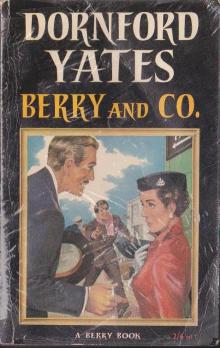 Berry and Co.
Berry and Co. Jonah and Co.
Jonah and Co.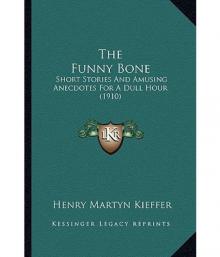 The Funny Bone: Short Stories and Amusing Anecdotes for a Dull Hour
The Funny Bone: Short Stories and Amusing Anecdotes for a Dull Hour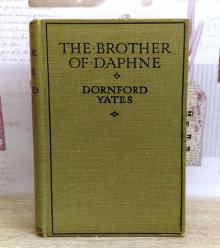 The Brother of Daphne
The Brother of Daphne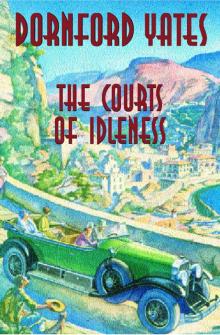 Courts of Idleness
Courts of Idleness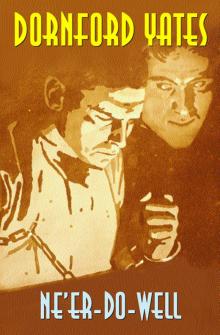 Ne'er Do Well
Ne'er Do Well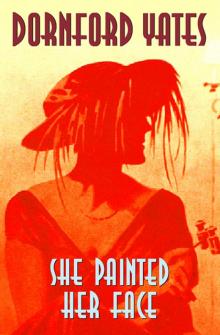 She Painted Her Face
She Painted Her Face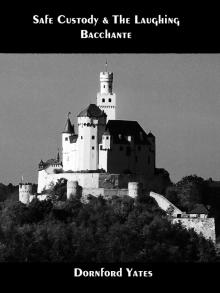 Safe Custody and Laughing Bacchante
Safe Custody and Laughing Bacchante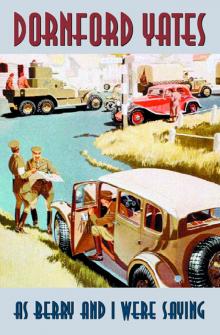 As Berry and I Were Saying
As Berry and I Were Saying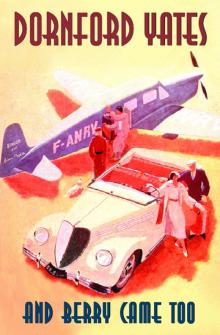 And Berry Came Too
And Berry Came Too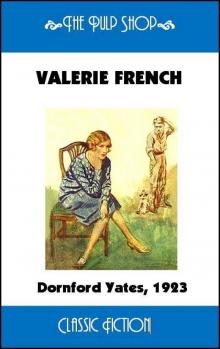 Valerie French (1923)
Valerie French (1923)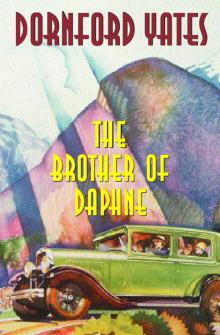 Brother of Daphne
Brother of Daphne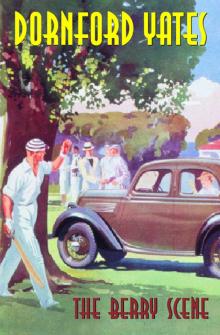 Berry Scene
Berry Scene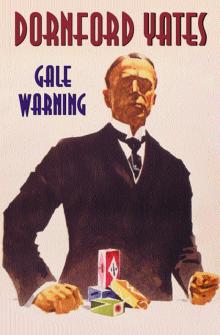 Gale Warning
Gale Warning B-Berry and I Look Back
B-Berry and I Look Back Storm Music (1934)
Storm Music (1934)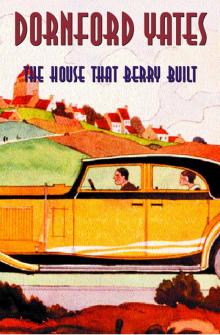 House That Berry Built
House That Berry Built